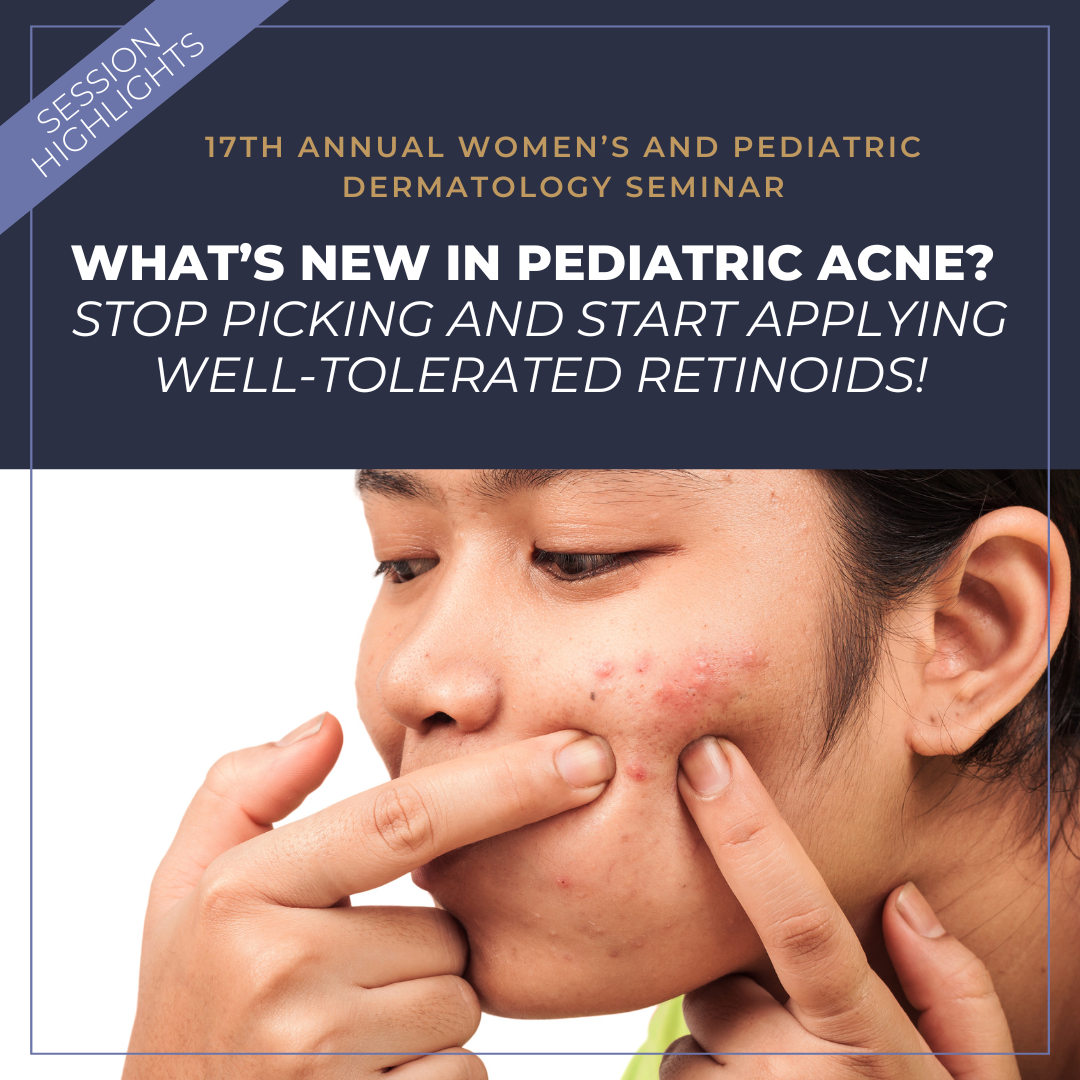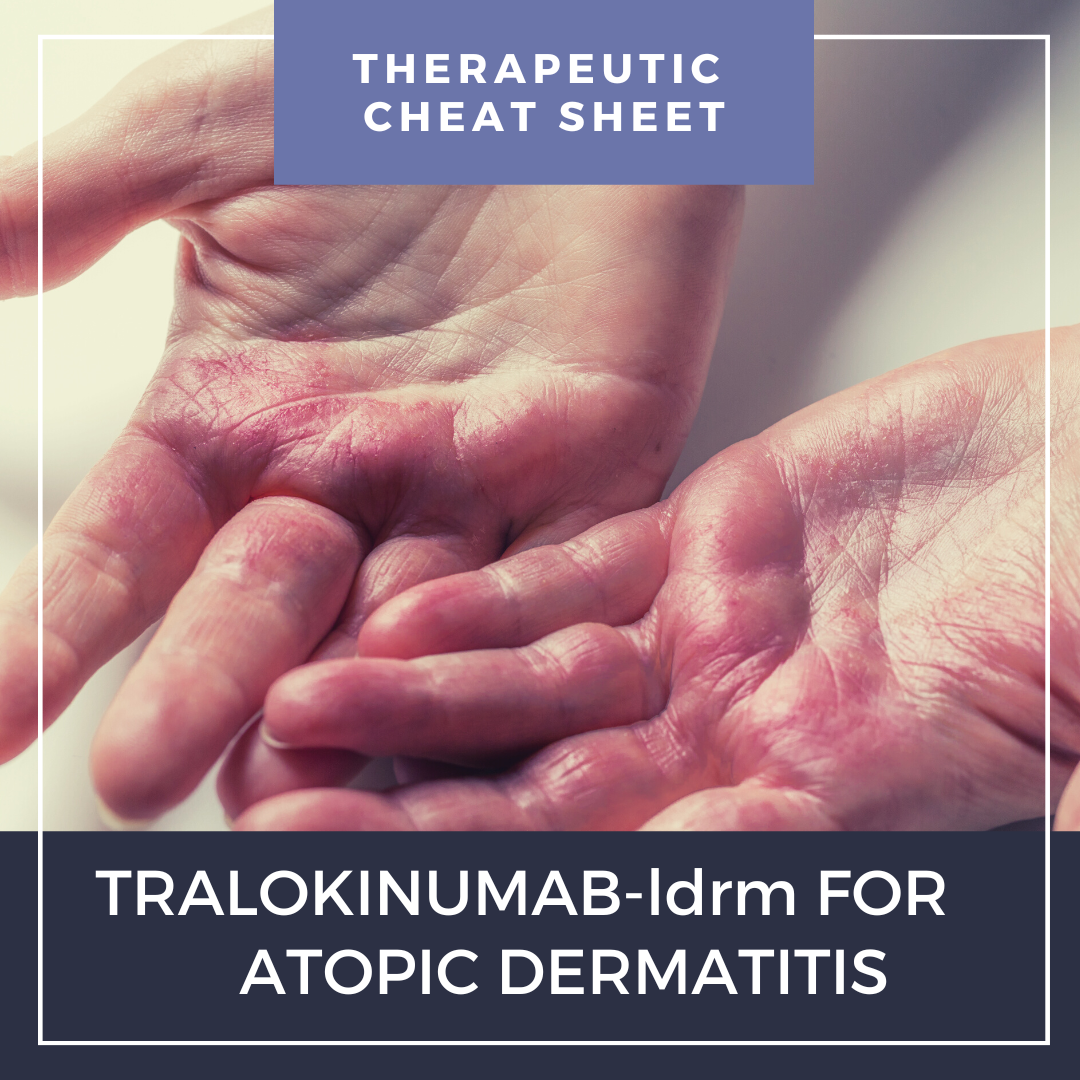What’s New in Pediatric Acne? Stop Picking and Start Applying Well-Tolerated Retinoids!
 Linda Stein Gold, Director of Dermatology Clinical Research at Henry Ford Health System, lead us through “Acne across the ages” at the 17th Annual Women’s and Pediatric Dermatology Seminar. She busted through several acne myths, which are easily debunked with new acne medications:
Clascoterone 1% cream: it reduces sebum production in the skin! Similar to spironolactone, it is an anti-andr …
Linda Stein Gold, Director of Dermatology Clinical Research at Henry Ford Health System, lead us through “Acne across the ages” at the 17th Annual Women’s and Pediatric Dermatology Seminar. She busted through several acne myths, which are easily debunked with new acne medications:
Clascoterone 1% cream: it reduces sebum production in the skin! Similar to spironolactone, it is an anti-andr …
 Linda Stein Gold, Director of Dermatology Clinical Research at Henry Ford Health System, lead us through “Acne across the ages” at the 17th Annual Women’s and Pediatric Dermatology Seminar. She busted through several acne myths, which are easily debunked with new acne medications:
Clascoterone 1% cream: it reduces sebum production in the skin! Similar to spironolactone, it is an anti-andr …
Linda Stein Gold, Director of Dermatology Clinical Research at Henry Ford Health System, lead us through “Acne across the ages” at the 17th Annual Women’s and Pediatric Dermatology Seminar. She busted through several acne myths, which are easily debunked with new acne medications:
Clascoterone 1% cream: it reduces sebum production in the skin! Similar to spironolactone, it is an anti-andr … 

 The August issue of the Journal of Drugs in Dermatology (JDD) focuses on Psoriasis and features mix of original articles, editorials, and case reports. Among many of the topics explored in this issue are treatment of scalp psoriasis, nail psoriasis, respiratory tract infections in patients using biologics for hidradenitis suppurativa, classification of actinic keratosis, lichen planus pigmentosus …
The August issue of the Journal of Drugs in Dermatology (JDD) focuses on Psoriasis and features mix of original articles, editorials, and case reports. Among many of the topics explored in this issue are treatment of scalp psoriasis, nail psoriasis, respiratory tract infections in patients using biologics for hidradenitis suppurativa, classification of actinic keratosis, lichen planus pigmentosus …  Everyday Health recently posted an article about the benefits of combined dermatology and rheumatology clinics in the treatment of psoriatic arthritis. Does research show a patient care benefit? What are ways dermatology and rheumatology providers can work better together outside of a combined clinic model?
For expert advice, I reached out to Brad Glick, DO, MPH, clinical assistant professor …
Everyday Health recently posted an article about the benefits of combined dermatology and rheumatology clinics in the treatment of psoriatic arthritis. Does research show a patient care benefit? What are ways dermatology and rheumatology providers can work better together outside of a combined clinic model?
For expert advice, I reached out to Brad Glick, DO, MPH, clinical assistant professor …  On this Mnemonic Monday, we challenge you to remember the types of interpolation flaps. Interpolation flaps are tissue importation flaps, which are staged, with pedicle division occurring 2-3 weeks after the initial flap placement, with the following mnemonic:
Play Like My Retro Turntable
P=paramedian forehead flap
Supratrochlear artery axial fap
L= lip switch flap
Aka Abbe flap …
On this Mnemonic Monday, we challenge you to remember the types of interpolation flaps. Interpolation flaps are tissue importation flaps, which are staged, with pedicle division occurring 2-3 weeks after the initial flap placement, with the following mnemonic:
Play Like My Retro Turntable
P=paramedian forehead flap
Supratrochlear artery axial fap
L= lip switch flap
Aka Abbe flap …  Atopic dermatitis is a common, chronic, life-altering disease. With its visibility and debilitating pruritus, atopic dermatitis significantly impacts our patients’ quality of life. For those with resistant and extensive disease, we are happy to have numerous new systemic agents at our disposal, one being tralokinumab, an IL-13 antagonist. We continue our series, Therapeutic Cheat Sheet, with a c …
Atopic dermatitis is a common, chronic, life-altering disease. With its visibility and debilitating pruritus, atopic dermatitis significantly impacts our patients’ quality of life. For those with resistant and extensive disease, we are happy to have numerous new systemic agents at our disposal, one being tralokinumab, an IL-13 antagonist. We continue our series, Therapeutic Cheat Sheet, with a c …